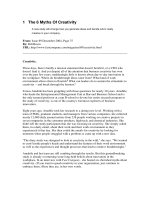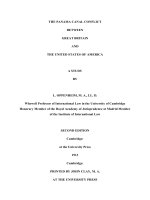The 5 Rules of Happiness pdf
Bạn đang xem bản rút gọn của tài liệu. Xem và tải ngay bản đầy đủ của tài liệu tại đây (69.28 KB, 3 trang )
The 5 Rules of Happiness
By Burt Goldman, The American Monk
You know when you're happy, and certainly no one has to tell you when
you're sad. But what is it that makes a person happy?
It is important to realize that what makes you happy might depress another
person. There are people, because of guilt, a feeling they do not deserve
what they have, or a feeling they will lose what they have that makes them
unhappy when they should be happy.
Possessions are a poor measure of happiness. Possessions are subjective and
relative to the individual and the individual's viewpoint. Instead, we will use
a philosophy as an example.
This philosophy is about enjoying things you like, avoiding or changing
things you do not like, and accepting what you cannot avoid or change by
the skillful use of your viewpoint. The use of this philosophy, as embodied
in the five rules, will allow you to test many problem areas in your life and
find solutions. With this philosophy, you will be well on your way on your
pursuit of happiness.
Rule Number One: If You Like a Thing, Enjoy It.
Now that seems outrageously simple. At first you might say, "That's
ridiculous, of course if I like something I'm going to enjoy it." But when you
stop to think about it you'll probably agree that there are many things in life
that we like but don't enjoy. The reasons we don't enjoy things we like are
(a) guilt, and (b) fear. You will not enjoy something you like if you feel
guilty after having done the thing, or if you are fearful of the consequences
of doing it.
Rule Number Two: If You Don't Like a Thing, Avoid It.
The second rule seems simple enough, but reflect for a moment on how
many people are involved with things they do not like — a job, a person, a
vehicle, a type of food, any one of a thousand things — and for some reason
they don't avoid those things. "Well, I can't avoid it. I have to work there
because I need the money." Or, "I have to be involved with this person for
many valid reasons." How many justifications can you think of for not
avoiding the things you do not like to do?
Rule Number Three: If You Don't Like a Thing, and You Cannot Avoid
It, Change It.
Here again, the answer is simple: change it. But just as in avoidance we
rationalize that we need something about it — the money, the time, the
security — something is holding you to that particular thing if you don't like
it, cannot avoid it, won't change it, but are still involved with it.
Rule Number Four: If You Don't Like a Thing, Cannot Avoid It, and
Cannot or will Not Change It, Accept It.
Acceptance — now there is a catch. How can you accept something you
don't like? How in the world do you accept something that is 'unacceptable'?
How do you accept a situation that you're not happy with? How do you
accept a person that you're not happy with? Well, you really don't have to
accept anything; you can, of course, be unhappy. If you don't like it, won't
change it, cannot avoid it, and will not accept it, I guarantee that you will be
unhappy. There are, however, five rules to the secret of happiness, and
within the fifth lies the key.
Rule Number Five: You Accept a Thing By Changing Your Attitude
Towards It.
You are the result of your viewpoints and attitudes. Everything is relative to
the person experiencing it. There are no absolutes — nothing is good,
nothing bad, except as it relates to you. Nor is life good or bad. Life simply
is. You change those things you wish by changing your viewpoint about
them.
How easy!
How difficult!
Your attitudes and viewpoints are all part of your mind and once you
develop the power of self mind control you will be the master of your own
attitudes and viewpoints. Using these five rules you'll soon find yourself on
the right path on the pursuit of happiness. You'll realize why people are
unhappy. Eventually it will become automatic, and you'll find happiness a
predominant state of mind. Once you realize the ease of acquiring this
emotion, you develop an entirely new scale of highs and lows.
Unremitting happiness, of course, is not a possible or desirable state.
According to the principle of rhythm, there is always an inflow and outflow,
an ebb tide and a flood tide. You'll always have highs and lows — there's no
way to avoid that. However, your highs will be higher and your lows will be
higher. You'll then find that what is a happy state for you might be a state of
depression for someone unaware of the Five Rules of Happiness.









